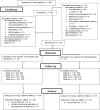A randomized trial of contingency management for smoking cessation in the homeless
- PMID: 29461070
- PMCID: PMC5858980
- DOI: 10.1037/adb0000350
A randomized trial of contingency management for smoking cessation in the homeless
Abstract
Smoking-cessation services are an unmet need among the homeless, who smoke at rates more than 4 times the national estimate. Successful interventions have high potential for improving tobacco-related health disparities among homeless smokers. Contingency management (CM) is a behavioral intervention with efficacy in a number of substance-use disorder populations, including smokers. However, no randomized studies have evaluated the effect of CM in homeless smokers. We examined smoking-related outcomes in homeless smokers (N = 70) randomized to standard-care (SC) smoking cessation involving transdermal nicotine-replacement therapy (NRT), standard counseling, and carbon monoxide (CO) monitoring or the same SC plus CM for negative CO sample submissions. Participants randomized to CM achieved significantly longer durations of consecutive abstinence and submitted a significantly higher proportion of CO-negative samples relative to standard-care participants. At 4 weeks postquit day, 22% were abstinent in the CM condition and 9% were abstinent in the SC condition. At the 6-month follow-up, about 10% of smokers in both conditions were abstinent. This study demonstrates that CM is an efficacious option to increase initial quit rates in homeless smokers, but methods to extend effects are needed. (PsycINFO Database Record
(c) 2018 APA, all rights reserved).
Figures
References
-
- Aidala AA, The Center for Homelessness Prevention Studies Modified Housing Items: Research version 2012
-
- Alessi SM, Badger GJ, Higgins ST. An experimental examination of the initial weeks of abstinence in cigarette smokers. Experimental and Clinical Psychopharmacology. 2004;12(4):276–287. http//doi.org/10.1037/1064-1297.12.4.276. - DOI - PubMed
-
- Alessi SM, Petry NM. Smoking reductions and increased self-efficacy in a randomized controlled trial of smoking abstinence- contingent incentives in residential substance abuse treatment patients. Nicotine and Tobacco Research. 2014;16(11):1436–1445. http://doi.org/10.1093/ntr/ntu095. - DOI - PMC - PubMed
-
- Arnsten JH, Reid K, Bierer M, Rigotti N. Smoking behavior and interest in quitting among homeless smokers. Addictive Behaviors. 2004;29(6):1155–1161. http://doi.org/10.1016/j.addbeh.2004.03.010. - DOI - PubMed
-
- Baggett TP, Chang Y, Singer DE, Porneala BC, Gaeta JM, O’Connell JJ, Rigotti NA. Tobacco-, alcohol-, and drug-attributable deaths and their contribution to mortality disparities in a cohort of homeless adults in Boston. American Journal of Public Health. 2015;105(6):1189–1197. http//doi.org/10.2105/AJPH.2014.302248. - DOI - PMC - PubMed
Publication types
MeSH terms
Grants and funding
LinkOut - more resources
Full Text Sources
Other Literature Sources
Medical


